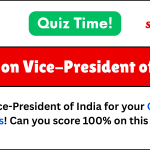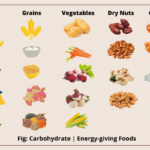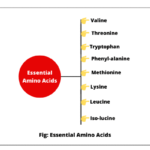30 Fundamental Rights MCQ for Competitive Exams
Welcome to this ultimate Fundamental Rights MCQ quiz. In this quiz, we’ve compiled the top 30 multiple-choice questions based on the Fundamental Rights of India. These MCQ quizzes will test your knowledge and boost your preparation for UPSC, SSC, RRB, and State PCS exams. You’ll get a scorecard at the end of the quiz to check your performance.
So, are you ready to score 30/30? Let’s find out how well you really know the Fundamental Rights of India. Let’s begin with question number 1.👇
1. In which Part of the Indian Constitution are the Fundamental Rights enshrined?
A. Part I
B. Part II
C. Part III
D. Part IV
c
Fundamental Rights are contained in Articles 12 to 35 of the Constitution under Part III. Part III of the Constitution is called corner stone of the Constitution.
2. Part III and which Part of the Indian Constitution together are called the “Conscience of the Constitution”?
A. Part II
B. Part IV
C. Part V
D. Part VI
b
Part III (Fundamental Rights) and Part IV (Directive Principles of State Policy) together are called the “Conscience of the Constitution” because they represent its moral core.
3. Which Part of the Indian Constitution is known as the “Magna Carta of India”?
A. Part II
B. Part III
C. Part IV
D. Part V
b
Part III of the Indian Constitution is known as the “Magna Carta of India” because it guarantees Fundamental Rights, which are crucial for protecting citizens’ basic freedoms and dignity.
4. Which Articles in the Constitution contain the Fundamental Rights?
A. Articles 12 to 35
B. Articles 36 to 51
C. Articles 51A to 52
D. Articles 10 to 21
a
Fundamental Rights are enshrined in Articles 12–35 under Part III of the Constitution.
5. Article 13 of the Indian Constitution deals with which of the following?
A. Equality before law
B. Judicial review of laws
C. Right to freedom of speech
D. Protection against arrest
b
Article 13 forms the basis of judicial review in India.
6. Judicial review in India is a feature borrowed from which country’s Constitution?
A. United Kingdom
B. France
C. Canada
D. USA
d
The concept of judicial review is derived from the US Supreme Court’s decision in Marbury v. Madison (1803), forming the basis of the Indian judicial review system.
7. Which clause of Article 13 prevents the State from making new laws that violate Fundamental Rights?
A. Article 13(1)
B. Article 13(2)
C. Article 13(3)
D. Article 13(4)
b
Article 13(2) prohibits the State from making laws that take away or abridge Fundamental Rights. If any such law is made, it is void.
8. Absolute Fundamental Rights are given under which of the following Articles?
A. Article 19 and Article 21
B. Article 15 and Article 16
C. Article 14 and Article 24
D. Article 17 and Article 24
d
Absolute Fundamental Rights are given under Article 17 and Article 24.
9. Which of the following Rights are outside Part III (Fundamental Rights) of the Indian Constitution?
A. Right to acquire property
B. Freedom of commerce and trade
C. Right to vote
D. All of the above
d
All three rights listed are NOT Fundamental Rights and lie outside Part III.
10. How many Fundamental Rights are currently provided by the Indian Constitution?
A. 6
B. 7
C. 8
D. 9
a
Originally, Indian Constitution provided for seven Fundamental Rights. But the Right to Property was removed from the list of Fundamental Rights by the 44th Constitution Amendment Act, 1978. Thus, at present, there are only 6 Fundamental Rights.
11. Which of these is not included as a Fundamental Right in the Constitution of India?
A. Right to freedom to speech
B. Right to equality before law
C. Right to constitutional remedies
D. Right to equal wages for equal work
d
12. Which Article of the Constitution specifically deals with “Cultural and Educational Rights” protecting the language, script, and culture of minorities?
A. Articles 29-30
B. Articles 25-28
C. Articles 23-24
D. Articles 19-22
a
Article 29 deals with protection of language, script, and culture of minorities. While article 30 deals with right of minorities to establish and administer educational institutions.
13. Which one of the following Rights did B.R. Ambedkar describe as the “heart and soul of the Indian Constitution”?
A. Right to freedom of religion
B. Right to property
C. Right to equality
D. Right to constitutional remedies
d
Ambedkar called Article 32 (right to constitutional remedies) the “heart and soul” of the Constitution because it enables enforcement of the other Fundamental Rights. Article 32 deals with right to move the Supreme Court for the enforcement of Fundamental Rights including the Writs of (1) Habeas corpus (2) Mandamus (3) Prohibition (4) Certiorari (5) Quo warranto.
14. The Right against Exploitation, which deals with the prohibition of traffic in human beings and forced labour, is enshrined under which articles?
A. Articles 19 to 22
B. Articles 23 to 24
C. Articles 25 to 28
D. Articles 29 to 30
b
Article 23 deals with the prohibition of traffic in human beings and forced labour. Article 24 deals with prohibition of employment of children in factories, etc.
15. Which Article abolishes untouchability in India?
A. Article 14
B. Article 15
C. Article 17
D. Article 19
c
Article 17 abolishes untouchability and forbids its practice in any form.
16. The Right to Equality for all citizens in matters relating to employment or appointment to any office under the state is guaranteed under which Article?
A. Article 14
B. Article 15
C. Article 16
D. Article 17
c
Article 16 deals with equality of opportunity for all citizens in matters relating to employment or appointment to any office under the state. No citizen shall be discriminated on the basis of race, religion, caste, sex, descent, place of birth or residence. This is confined to the Indian citizens only.
17. The Right to Privacy has been held by the Supreme Court to be part of which Fundamental Right?
A. Article 14
B. Article 19
C. Article 21
D. Article 32
c
The Supreme Court has interpreted the Right to Privacy as part of the Right to Life & Personal Liberty under Article 21.
18. Which of the following freedoms are guaranteed exclusively to citizens under Article 19 of the Indian Constitution?
- Freedom of speech and expression
- Freedom to assemble peacefully and without arms
- Freedom to form associations or unions
- Freedom to move freely throughout the territory of India
- Freedom to reside and settle in any part of India
- Freedom to do business in any trade in the list prepared by Indian Government.
A. 1, 2 and 3 only
B. 1, 2, 3, 4 and 5 only
C. 2, 4 and 6 only
D. 1, 2, 3, 4, 5 and 6
b
All five freedoms listed in Article 19(1) are correct except six because there is freedom to practice any profession or to carry on any occupation, trade or business. They are available only to citizens, not to foreigners. These form the core of the Right to Freedom under Part III.
19. By which Amendment was Article 21A (Right to Education) inserted into the Constitution making elementary education a Fundamental Right for children of 6-14 years?
A. 73rd Amendment
B. 86th Amendment
C. 91st Amendment
D. 95th Amendment
b
The 86th Amendment Act, 2002 inserted Article 21A to make free and compulsory education for children aged 6-14 years a Fundamental Right.
20. Which of the following statements is true regarding Fundamental Rights and Directive Principles?
A. Fundamental Rights are non-justiciable, while DPSPs are justiciable.
B. Both are justiciable.
C. Fundamental Rights are justiciable; DPSPs are non-justiciable.
D. Both are non-justiciable.
c
Fundamental Rights are justiciable, meaning they are legally enforceable and can be challenged in court, while Directive Principles of State Policy (DPSPs) are non-justiciable, meaning they cannot be enforced by courts.
21. Which of the following can a court issue for enforcement of Fundamental Rights?
A. A decree
B. An ordinance
C. A writ
D. All of the above
c
A court can issue a “writ” for the enforcement of fundamental rights.
22. Civil equality implies –
A. Equality before law
B. Equality for opportunity
C. Equal distribution of wealth
D. Equal right to participate in the affairs of the State
a
Civil equality implies equality before the law and equal protection of the laws.
23. Who is the guardian of Fundamental Rights enumerated in Indian Constitution?
A. Supreme Court
B. Parliament
C. Constitution
D. President
a
The guardian of Fundamental Rights in the Indian Constitution is the Judiciary — particularly the Supreme Court (via Article 32) and the High Courts (via Article 226).
24. At present in the Indian Constitution Right to Property is –
A. Fundamental Right
B. Legal Right
C. Moral Right
D. None of these
b
At present in the Indian Constitution Right to Property is legal right.
25. Which of the following Fundamental Rights is not available to foreign citizens
A. Right to equality before the law
B. Right to life and personal liberty
C. Freedom of speech and expression
D. Protection against arbitrary arrest
c
Article 19 (freedom of speech, movement, profession, etc.) is available only to citizens, not to foreigners.
26. Right to Information (RTI) Act aims to –
A. Secure access to information from public authorities
B. Provide information to public by a person who has got the information
C. Provide information by Government on public place
D. Secure information by police from culprits
a
The Right to Information (RTI) Act aims to promote transparency and accountability in government by giving citizens the right to access information held by public authorities
27. Which of the following courts is responsible for the enforcement of Fundamental Rights?
A. Supreme Court
B. High Court
C. District Court
D. Both A and B
d
Both Supreme court and High court are responsible for the enforcement of Fundamental Rights.
28. Right to information is necessary in India because it –
- Increases people’s participation in administration
- Makes administration more accountable to people
- Makes administration more innovative
- Makes people aware of administration decision making
A. 1, 2 and 3
B. 2, 3 and 4
C. 1, 2 and 4
D. 1, 3 and 4
a
The option d is not correct for RTI.
29. Which one of the following can not be suspended or restricted even during national emergency?
A. Right to reside and settle in any part of the country.
B. Right to life and personal liberty right.
C. Right to move freely throughout the territory of India.
D. Right to carry on any profession or business.
b
During a National Emergency (Article 352), Articles 19 rights can be suspended. Articles 20 and 21 cannot be suspended even during an Emergency.
30. Match List 1 (Article of the Constitution) with (Provisions) and select the correct answer using the codes given below the lists-
| List-1 | List-2 |
|---|---|
| A. Article 16 (2) | 1. No person can be discriminated against in the matter of public appointment on the ground of race, religion or caste. |
| B. Article 29 (2) | 2. No citizens shall be denied admission into any educational institution maintained by the State, or receiving State aid, on grounds of religion, race, caste language or any of them. |
| C. Article 30 (1) | 3. All minorities whether based on religion or language shall have to establish and administer educational institution of their choice. |
| D. Article 31 (1) | 4. No person shall be deprived of his property save by authority of law. |
A. A-1, B-2, C-3, D-4
B. A-1, B-2, C-4, D-3
C. A-4, B-3, C-2, D-1
D. A-4, B-3, C-1, D-2
a
The option A is correct.
Quiz Results
Total Questions: 0
Correct Answers: 0
Incorrect Answers: 0
Score: 0%








